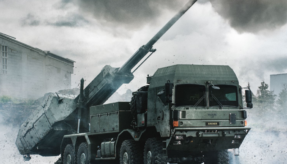
How defence contractors benefit from increased defence spend and strategic cross-border initiatives, article submitted by Richard Tall, Hans Mehrens, Claire Nilson and Emily Evans at Faegre Drinker.
Rising geopolitical uncertainty and increasing cyberthreats from foreign governments are forcing governments to increase their defence spending, driving record profits for contractors operating in the sector. The International Institute for Strategic Studies reported that NATO’s defence expenditure increased by 11% in 2024, up from an increase of 3% in 2023. This trend is likely to stay, particularly in areas such as autonomous vehicles, drones and cybersecurity.
With geopolitical challenges rising at home and afar, strategically aligned nations increasingly cooperate on defence initiatives, as can be seen from partnerships such as AUKUS, membership of which may widen in the future. These cooperations come with increasing opportunities for defence contractors in the participating nations, but there are also challenges of navigating potentially unfamiliar laws in other jurisdictions.
Going back to basics, the proof is in the name: conducting cross-border business involves moving things across borders, be that people, physical goods or data. This will require defence contractors to be ready to navigate a fairly complex web of laws, including laws on export controls, national security, immigration, and cyber security.
Whenever we talk about defence spending, clearly the US is a pivotal spender and key customer. Defence contractors that deal with US customers will be aware of the far reach of US export controls such as ITAR already, which due to its rules on re-export, even deals with defence-related “things” crossing non-US borders. Mirroring a trend we see in the US, the UK is also seeing strong export growth in the defence sector, especially in respect of air-to-air and surface-to-air missiles, as well as for fighter aircraft and aerospace manufacturing. UK defence companies are also successfully positioning themselves as leaders in cybersecurity and defence technologies, attracting orders globally in a sector that is increasingly focused on innovation and technological advancement. If you are a UK defence contractor seeking to unlock the US market, ITAR will be something you will most likely come across sooner rather than later.
Increasing order volumes will require defence contractors to efficiently scale-up their operations which necessitates hiring additional staff. Digitalisation and emerging technologies can play a useful part in bridging some of these gaps, but businesses will need to implement targeted recruitment strategies for key employees such as technicians and engineers, in order to effectively scale up their operations. Once hired, retention policies and staff incentivization programs will be key to ensuring a return on this investment into the education and security requirements of the workforce.
Contractors will also be aware of the new normal and changing expectations of junior employees who often value flexibility. However, security requirements are likely to hamper a defence firm’s ability to offer sought-after perks such as remote work. If firms choose to use third-party providers to plug these gaps instead, contractual agreements must provide for adherence to these security requirements and compliance with rapidly evolving legislation relating to cybersecurity and digital resilience.
Defence contractors conducting business across borders must ensure that their employees have the necessary immigration permission to live and work wherever they are located. In the UK, civilian employees working under contract to a NATO Force can apply under “Appendix International Armed Forces and International Civilian Employees” of the Immigration Rules. Their spouse and/or child(ren) may also apply for permission to accompany to the UK for the duration of the employee’s assignment. In some cases, civilian employees working for government contractors (and potentially also their family members) may be covered by the Status of Forces Agreement (SOFA) and, if so, will not need additional UK immigration permission. By their very nature, immigration laws are highly localized and expanding globally will require navigating those laws.
Finally, given the nature of the contracts that are being awarded in the defence sector, with many of them being long-term state contracts, there will be regulatory scrutiny over competition. Notably, representatives of the US government signaled concerns over the lack of competition in the US defence industry in 2022. The use of complex technologies and the development of specialised weapons creates pseudo-monopolies in relation to certain products throughout the supply chain and can leave governments reliant on an increasingly small number of global defence firms.
Whilst reliance on known operators in the defence sector can be desirable for governments due to security concerns over using foreign vendors, competition is key to fostering innovation. In turn, innovation in defence and aerospace is vital for governments, especially those in the US and the UK, to be able to maintain their global pre-eminence in the sector and for suppliers to be responsive to military needs. Increasing merger and acquisition movements, which we expect to see in the years to come, especially from mid-size firms who are attempting establish footholds in the US market, will only compound these developments.
Image credit: Kirill Neiezhmakov / Shutterstock.com
If you would like to join our community and read more articles like this then please click here








